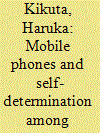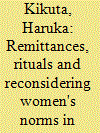| Srl | Item |
| 1 |
ID:
165965


|
|
|
|
|
| Summary/Abstract |
This paper examines the new ways to navigate family power dynamics among Muslim youth in contemporary Uzbekistan. Migration of labour from Uzbekistan increased rapidly in the 2000s. When young workers began to experience the freedom of making their own decisions in their everyday lives after migration, they became uncomfortable with the elders of the household making decisions on everything from daily chores to serious matters concerning their families. Youth who continued to live in Uzbekistan also expanded their areas of self-determination, such as in choosing their spouses, by securing private space through the use of mobile phones. The mobile phone can be an effective tool to improve the position of young wives, who tend to have the lowest status in the husband's family. Thus, the existing hierarchy or classical patriarchy in Muslim families can be navigated, challenged and circumvented by the use of mobile phones among the youth today.
|
|
|
|
|
|
|
|
|
|
|
|
|
|
|
|
| 2 |
ID:
144164


|
|
|
|
|
| Summary/Abstract |
This paper describes recent economic and social changes in Central Asian neighbourhood communities known as mahallas, using data from a town in Ferghana Valley. First, it examines how the increasing costs of life-cycle rituals are damaging the harmony of mahallas. Since 2007, more and more hosts have begun to outsource the provision of food and services for these rituals, using money acquired mostly through emigrant labour. This in turn lessens mahallas’ mutual aid practices, and reveals emerging economic disparities between neighbours. Secondly, the paper argues that emigration has had transformative effects on the lifestyles of Muslim women in mahallas. With the globalization of their economy, conventional local norms are becoming harder to obey, and some young and middle-aged women are choosing to live outside these norms. Dependence on emigrant labour and the associated remittances has significantly affected the lifestyles and morals of mahalla inhabitants.
|
|
|
|
|
|
|
|
|
|
|
|
|
|
|
|
| 3 |
ID:
152307


|
|
|
|
|
| Summary/Abstract |
In some Central Asian oasis towns, the patron saints of craftsmen, known as pirs, have continued to be venerated, despite the repression of Islam and changes to the industrial structure during the Soviet Era. This paper analyses the social function and individual significance of pir veneration in the modern era, using ethnographic observations and interviews conducted in a ceramics town in Uzbekistan. Today, many old customs practised in pottery studios have become mere formalities, and the controlling role of the pirs over ceramist groups is declining. However, this is not necessarily indicative of an immediate decline in the pirs’ power. Some ceramists believe their highly skilled masters to be quasi-pirs and that the pir provides them with desirable goals, in addition to an ideal form to which to aspire.
|
|
|
|
|
|
|
|
|
|
|
|
|
|
|
|